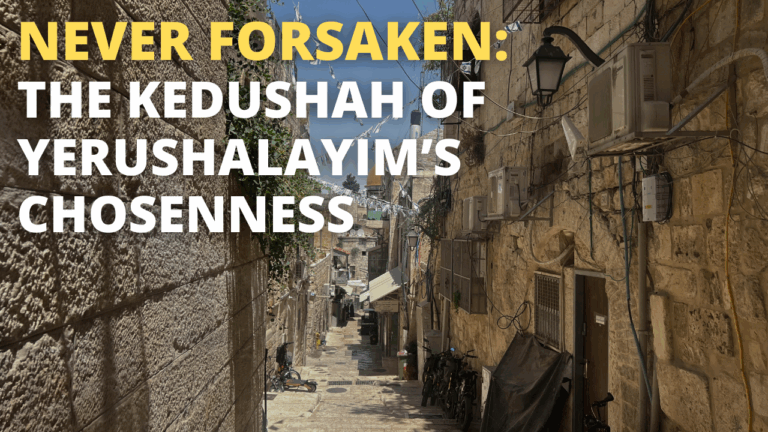The Princess and Her Delicious Dish
As Yaakov Avinu gathers the shevatim around his deathbed, he blesses them and prophesizes about their future. The Gemara Pesachim (56a) famously tells us that as Yaakov prepared to reveal eschatological secrets, the Divine Presence departed from him. He worried that one of his son’s may be inadequate to receive the prophecy, “perhaps, God forbid, there is a flaw in my bed, like Avraham who gave birth to Yishmael, and my father Yitzchak who gave birth to Eisav!” The brothers all responded in unison, שמע ישראל ה’ אלקינו ה’ אחד. “Just as there is only One in your heart, so too there is only One in ours.” In elation, Yaakov responds with the immortal words, ברוך שם כבוד מלכותו לעולם ועד, Blessed is the glorious name of His kingdom forever and ever. Paralleling his original dream of the supernal latter on the Har HaBayit, Yaakov is surrounded by twelve rocks that are united into one integrated whole, bound together by their undying loyalty and belief in achdut Hashem.
As the Rambam (Hilchot Kriat Shema 1:4) explains, we recite this same verse of ברוך שם today to imitate and relive the experience of our forefather Yaakov. However, as every school child knows, we do so quietly. The Gemara Pesachim explains that we are caught in a pickle: on one hand, Moshe Rabbeinu never recited this verse when explicating the Parsha of Shema to Am Yisrael in Sefer Devarim. On the other hand, Yaakov Avinu himself said it. To appease both concerns, we recite Baruch Shem quietly. In the study house of Rebbe Ami, they provided the following parable. A princess smelled the aroma of a delicious dish. It would be unbefitting for her to explicitly request for it, and it would be painful for her not to have it. Her servants therefore began bringing it to her secretly.
This cryptic mashal is exceedingly profound and confusing. What is problematic with the great praise of Baruch Shem? In a seminal approach to this Gemara, Rav Chaim Volozhiner (Nefesh HaChaim 3:11) explains that the pasuk of Shema Yisrael is the ultimate declaration of Divine unity. We willingly nullify all of existence in front of the omnipresence of HaKadosh Baruch Hu, essentially declaring אין עוד מלבדו, there is none other than Him. Our illusion of independence is a fleeting mirage; ultimately, we are inextricably bound to Him. The following verse of Baruch Shem is a “lower” declaration of unity. We acknowledge the reality of our worldly experience in which we perceive separation and independence. But we dedicate all of the lower realms to Hashem’s glorious kingdom.
After declaring the awesome total unity of Hashem with the pasuk of Shema, the recitation of Baruch Shem is almost an embarrassment. “Would one consider it a praise of a human king to say that he rules over many ants and fleas and that they willingly accept the yoke of his rule upon them?” Nonetheless, God revealed to us His desire for such praise, so we say it, discreetly. (A more complete explication of these ideas is warranted, but we’ll leave that for a different time.)
However, there is one place in which Baruch Shem is recited constantly and vociferously. The Gemara Taanit (16b) explains that in the Mikdash, the congregation would respond with Baruch Shem to every single blessing instead of reciting amen. They did so with a deafening roar. (The Rambam explains in his commentary to the mishna in Rosh HaShanah 4:1 that the phrase Mikdash refers to the totality of Jerusalem. It is possible that the Rambam thought this Gemara Taanit applies to all of Jerusalem and not just to the Har HaBayit.)
How can we be less sensitive to the princess’ shame, in the palace of the King no less?! Where is the shame over this delicious dish for which we were so concerned everywhere else in the world?
In the holy city of Yerushalayim, the perception of Hashem’s unity is heightened. Under the Sha’ar HaShamayim, the heavenly gates that open to higher realms, a Jew’s natural sense of the Divine presence is sharpened. In the King’s palace, where He rejoices over His bride, the Jewish people unify and perceive their inextricable connection with Hashem. Ironically, it is specifically in the Mikdash that our perception of existence and God’s unity is not viewed as a contradiction. We can loudly and proudly declare Hashem’s unity and His the dominance of His glorious kingdom forever and ever. There is no embarrassment when the dish is served in the innermost sanctum, hidden from the view of all.
We will be’ezrat Hashem continue to discuss these ideas in the weeks to come.



